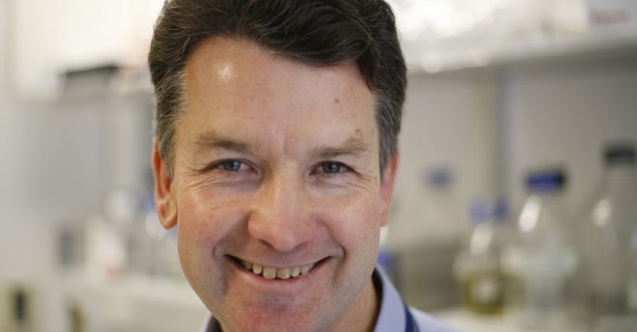How big the needle will be when you get a coronavirus vaccine and what side effects are likely

Having a vaccine to protect against coronavirus will be just like getting a flu or tetanus booster vaccine, says the professor leading the team trialling the new vaccines at St George's University in Tooting.
Professor Paul Heath heads up the university's vaccine institute and has praised the positive results of recent trials of the Oxford, Pfizer and Moderna vaccines as "fantastic news."
He told the Local Democracy Reporting Service: "It's fantastic that we now appear to have effective and safe vaccines against COVID-19. And you know, two weeks ago, we really had no idea whether any of the many vaccines that were going through clinical trials would be effective.
"It was based on assumptions and of course, very good biological reasons why these vaccines should be effective. But the truth is we didn't know if any would be. So we now have this proof that the concept of a vaccine against COVID-19 is one that works."
He said the team at St George's vaccine institute have "never worked any harder" than over the last 10 months, in an "absolutely crazy and completely unprecedented" year.
"We've never been in a situation before where a vaccine, like the Moderna vaccine, which started in March in humans, is now here in November with the results of that efficacy trial. It's just a completely unprecedented journey.
"Everything about it has been different to what we would normally have seen with vaccine development and trials, and we've been doing it for many years."
But with so many different vaccines being mentioned on the news, there is some confusion about what it will be like to get a coronavirus injection and if we'll need to get more than one dose.
We asked Professor Heath some key questions about what we can expect.
What will it be like getting a coronavirus vaccine? Is the needle very big?
Professor Heath reassured us that "these vaccines are delivered in the normal way, like going in to get your influenza vaccine for example. So there's nothing novel about that aspect of the vaccination process."
He explained that for the person getting the vaccine is "pretty similar" to getting a flu or tetanus vaccine boost - so it won't take very long and it's nothing to be scared of.
Any reaction to the vaccine "varies from one Covid-vaccine to another as it does from one flu vaccine to another" but is usually very mild.
How will the vaccines be stored?
The different vaccines will have different transport and storage needs.
Professor Heath explains: "The Pfizer vaccine is particularly challenging there with its requirement for very low temperatures. The Moderna vaccine also has a requirement for that but only really for the transport aspect. It seems that it can be stored and then delivered to patients at a much more conventional fridge-type temperature.
"Then the other vaccines moving forward, most of them really are sort of fridge-temperature, so again, what you would expect with any other vaccine."
He said many people are busy working out how to deliver these vaccines to GP surgeries if they need to be kept under certain conditions.
Why are there so many different types of vaccines? Will they all work just as well?
Professor Heath says we need lots of different vaccines because "billions" of doses will be needed worldwide, and therefore, there will need to be many different suppliers.
He said the different vaccines may have different qualities which would allow them to be used in different ways.
"There may be different degrees of effectiveness, they may be more or less effective in different groups, perhaps some are going to be better in the elderly than in younger people, or are going to be more suited to children or pregnant women, or for immuno-compromised groups," he said.
Will I have to have a coronavirus vaccine every year, like the flu? Will I have the same vaccine each time?
The simple answer is we don't know.
Professor Heath said: "There's a general feeling that probably booster doses will be required based on what we know about some of the other coronaviruses and the duration of immunity. But we don't know that yet for certain. This is the sort of thing that will come out in the post-implementation phase."
People who have received vaccines will be followed for the next 12 to 24 months to see what happens to their immunity.
Once vaccines are implemented in the wider community it will also be possible to see if there are more cases in people who were vaccinated more than 12 months before, and if a boost is needed.
This is what happened with the MMR vaccine, for example.
Which type of vaccine am I likely to get?
With so many vaccines in the pipeline, supply and cost will help to decide which vaccine you get in the future, especially if you're not a frontline care worker or vulnerable person who is likely to be the priority with the first set of vaccines coming out over this winter.
It is also possible for you to receive a mix of vaccines if boosters are needed.
Professor Heath said: "In terms of the efficacy it may be that boosting with a different vaccine provides an even better immune response, or it may be that it just so happens that they are the only vaccines we have at that time."
The Pfizer and Moderna coronavirus vaccines use new technology. What does this mean for the future of medicine?
The Pfizer and Moderna vaccines use new RNA technology which Professor Heath says "opens the doors for a whole range of other RNA vaccines now against infections" such as new influenza viruses and Zika, for example.
He explained that Moderna has a range of other RNA vaccines against different pathogens in phase one clinical testing, and the success of the coronavirus vaccine will provide them with confidence that these may also work.
Likewise, BioNTech, the partner with Pfizer, has been focused on cancer vaccines using this technology.
Professor Heath warns that infections and cancers are "different things" but the news on the RNA coronavirus vaccine is a "real boost to what they're doing."
What's happening at St George's now?
St George's is now focussing on the Novavax trial, which is now the biggest of all the phase 3 trials, surpassing Oxford.
But in the meantime, the vaccine institute is still seeing and following up participants from other stages of the Oxford and Imperial trials.
If any participants develop symptoms of COVID-19 they need to be swabbed and examined, and may have to give extra samples for follow-up work.
What will the next few months be like while we wait for vaccines to be rolled out?
Professor Heath says the recent news about the effectiveness of the Oxford, Pfizer and Moderna vaccines "bodes incredibly well for the many other vaccines coming through."
"It's all very good news. But of course we don't have those vaccines right now. We still need to get through this winter and as the Government and others have been saying, undoubtedly we need to maintain all of the things that we do know make a difference in preventing COVID-19 in terms of the social isolation and the masking and the handwashing and all of these other things.
"These remain critically important to bridge us over this period of time until these vaccines are rolled out. Though we can be wonderfully joyous about this we mustn't drop our guard with regard to the virus because it's still there, it's still circulating.

Türkiye Cumhuriyeti'nde 14 Mayıs 2023'de yapılacak Cumhurbaşkanlığı seçimini kim kazanır?
| Takımlar | O | P |
|---|---|---|
| 1. Galatasaray | 33 | 90 |
| 2. Fenerbahçe | 33 | 86 |
| 3. Trabzonspor | 33 | 55 |
| 4. Beşiktaş | 33 | 51 |
| 5. Başakşehir | 33 | 49 |
| 6. Rizespor | 33 | 48 |
| 7. Kasımpasa | 33 | 46 |
| 8. Antalyaspor | 33 | 45 |
| 9. Alanyaspor | 33 | 45 |
| 10. Sivasspor | 33 | 45 |
| 11. A.Demirspor | 33 | 41 |
| 12. Samsunspor | 33 | 39 |
| 13. Ankaragücü | 33 | 37 |
| 14. Kayserispor | 33 | 37 |
| 15. Konyaspor | 33 | 36 |
| 16. Gaziantep FK | 33 | 34 |
| 17. Hatayspor | 33 | 33 |
| 18. Karagümrük | 33 | 33 |
| 19. Pendikspor | 33 | 30 |
| 20. İstanbulspor | 33 | 16 |
| Takımlar | O | P |
|---|---|---|
| 1. Eyüpspor | 31 | 69 |
| 2. Göztepe | 31 | 63 |
| 3. Ahlatçı Çorum FK | 31 | 55 |
| 4. Sakaryaspor | 31 | 54 |
| 5. Bodrumspor | 31 | 52 |
| 6. Kocaelispor | 31 | 52 |
| 7. Bandırmaspor | 31 | 47 |
| 8. Boluspor | 31 | 47 |
| 9. Gençlerbirliği | 31 | 47 |
| 10. Erzurumspor | 31 | 42 |
| 11. Ümraniye | 31 | 37 |
| 12. Manisa FK | 31 | 36 |
| 13. Keçiörengücü | 31 | 36 |
| 14. Şanlıurfaspor | 31 | 34 |
| 15. Tuzlaspor | 31 | 33 |
| 16. Adanaspor | 31 | 32 |
| 17. Altay | 31 | 15 |
| 18. Giresunspor | 31 | 7 |
| Takımlar | O | P |
|---|---|---|
| 1. Arsenal | 34 | 77 |
| 2. Liverpool | 33 | 74 |
| 3. M.City | 32 | 73 |
| 4. Aston Villa | 34 | 66 |
| 5. Tottenham | 32 | 60 |
| 6. Newcastle | 32 | 50 |
| 7. M. United | 32 | 50 |
| 8. West Ham United | 34 | 48 |
| 9. Chelsea | 32 | 47 |
| 10. Brighton | 32 | 44 |
| 11. Wolves | 33 | 43 |
| 12. Fulham | 34 | 42 |
| 13. Bournemouth | 33 | 42 |
| 14. Crystal Palace | 33 | 36 |
| 15. Brentford | 34 | 35 |
| 16. Everton | 33 | 30 |
| 17. Nottingham Forest | 34 | 26 |
| 18. Luton Town | 34 | 25 |
| 19. Burnley | 34 | 23 |
| 20. Sheffield United | 33 | 16 |
| Takımlar | O | P |
|---|---|---|
| 1. Real Madrid | 32 | 81 |
| 2. Barcelona | 32 | 70 |
| 3. Girona | 32 | 68 |
| 4. Atletico Madrid | 32 | 61 |
| 5. Athletic Bilbao | 32 | 58 |
| 6. Real Sociedad | 32 | 51 |
| 7. Real Betis | 32 | 48 |
| 8. Valencia | 32 | 47 |
| 9. Villarreal | 32 | 42 |
| 10. Getafe | 32 | 40 |
| 11. Osasuna | 32 | 39 |
| 12. Sevilla | 32 | 37 |
| 13. Las Palmas | 32 | 38 |
| 14. Deportivo Alaves | 32 | 35 |
| 15. Rayo Vallecano | 32 | 34 |
| 16. Mallorca | 32 | 31 |
| 17. Celta Vigo | 32 | 31 |
| 18. Cadiz | 32 | 25 |
| 19. Granada | 32 | 18 |
| 20. Almeria | 32 | 14 |










































